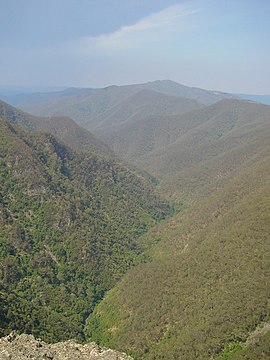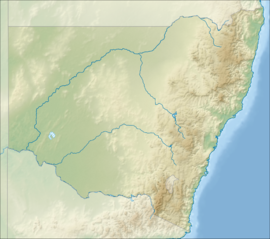Kanangra-Boyd National Park
|
Kanangra-Boyd National Park New South Wales |
|
|---|---|
|
IUCN category Ib (wilderness area)
|
|

Kanangra Grand Gorge
|
|
| Nearest town or city | Oberon |
| Coordinates | 33°56′16″S 150°05′27″E / 33.93778°S 150.09083°ECoordinates: 33°56′16″S 150°05′27″E / 33.93778°S 150.09083°E |
| Established | 3 December 1969 |
| Area | 686.6 km2 (265.1 sq mi) |
| Managing authorities | NSW National Parks & Wildlife Service |
| Website | Kanangra-Boyd National Park |
| See also | Protected areas of New South Wales |
The Kanangra-Boyd National Park is a protected national park that is located in the Central Tablelands region, west of the Southern Highlands and Macarthur regions, in New South Wales, in eastern Australia. The 68,660-hectare (169,700-acre) national park is situated approximately 180 kilometres (110 mi) south-west of Sydney. and is contiguous with the Blue Mountains National Park and the Nattai National Park. The park was established in 1969.
The Kanangra-Boyd National Park is one of the eight protected areas that, in 2000, was inscribed to form part of the UNESCO World Heritage–listed Greater Blue Mountains Area. The Kanangra-Boyd National Park is the most south–westerly of the eight protected areas within the World Heritage Site. The national park forms part of the Great Dividing Range.
Notable features of the national park include the Thurat Spires, Kanangra Walls, Mount Colong, and three waterfall systems - the Kalang, the 225-metre (738 ft) two–tiered drop Kanangara and the Morong falls. The park also features a series of karst landforms that can be explored by those with caving experience.
The movie Jedda was filmed in the Kanangra Walls area in 1954.
Kanangra-Boyd National Park is composed of two land units — the elevated, gently undulating Boyd Plateau and the area of creeks, rivers, gorges and ridges into which the plateau falls away. The plateau is traversed by the Kanangra Walls Road and can be accessed either from Oberon or Jenolan Caves. The road leads to Kanangra Walls. There are several well known landmarks in the park, such as Mount Cloudmaker, Kanangra Walls and the Thurat Spires. The word Kanangra is generally held to be a corruption of Gundangura and was called Thurat for some time.
...
Wikipedia

